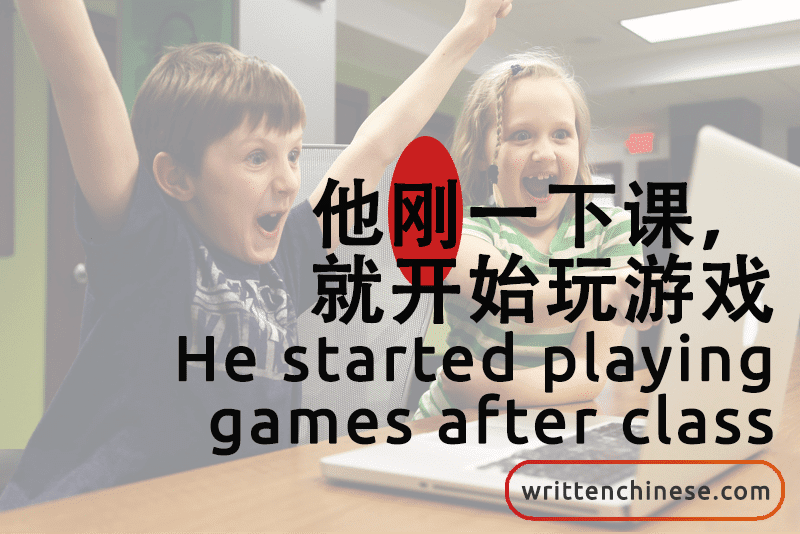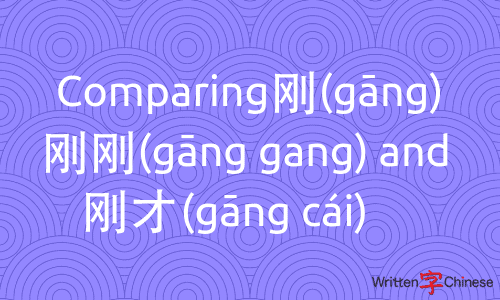It will only take [est_time] to read this post!
刚 (gāng), 刚刚 (gāng gang) and 刚才 (gāng cái) can all be used to express: ‘something just happened’ and can be used in a similar way to ‘just’ in English. However, there are slight differences between 刚 (gāng), 刚刚 (gāng gang) and 刚才 (gāng cái) and should be used in different circumstances. Keep reading to learn how to use 刚 (gāng), 刚刚 (gāng gang) and 刚才 (gāng cái).
刚 (gāng) and 刚才 (gāng cái)
‘Different Word Classes’
刚 (gāng) is an adverb and is placed after the subject and before the verb.
他刚去吃午饭。(tā gāng qù chī wǔ fàn) He just went for lunch.

刚才 (gāng cái) is a time noun and can be used before or after the subject. It can also be used as the subject in a sentence.
刚才他去吃午饭了。(gāng cái tā qù chī wǔ fàn le) / 他刚才去吃午饭了。(tā gāng cái qù chī wǔ fàn le) He went for lunch just a moment ago.
刚才比现在凉快。(gāng cái bǐ xiàn zài liáng kuai) It’s cooler now than just a moment ago.

‘Different time points’
刚才 (gāng cái) usually refers to a time between half an hour and 现在 (xiàn zài) ‘now’.
他刚才睡着了。(tā gāng cái shuì zháo le) He just fell asleep.

刚 (gāng) can be used to not only express a short time, such as 10 minutes ago but also for things that happened many years ago. This depends on the speakers‘ subjective feeling, similarly to 很久 (hén jiǔ) ‘a long time ago’.
他刚睡着。(tā gāng shuì zháo) He just fell asleep.
他刚结婚两个月。(tā gāng jié hūn liǎng gè yuè) He just got married two months ago.

他刚毕业一年。(tā gāng bì yè yī nián) He just graduated one year ago.
‘Different focus’
Sentences that include 刚才 (gāng cái) always emphasizes what happened (what has been done).
我刚才看了一集《生活大爆炸》。(wǒ gāng cái kàn le yī jí shēng huó dà bào zhà) I just watched an episode of The Big Bang Theory.

Sentences using 刚 (gāng) always emphasizes the time point (for something that just happened).
我刚看了一集《生活大爆炸》,妈妈就催我去睡觉。(wǒ gāng kàn le yī jí shēng huó dà bào zhà, mā ma jiù cuī wǒ qù shuì jiào) I had just finished an episode of The Big Bang Theory, and my mom hurried me to bed.
‘Different negative forms’
刚才 (gāng cái) and 刚 (gāng) are negated in different ways. 刚才 uses either 没 or 不:
刚才 (gāng cái) + 没 (méi) / 不 (bù)
对不起,我刚才没看见你的信息。(duì bu qǐ, wǒ gāng cái méi kàn jiàn nǐ de xìn xī) Sorry, I didn’t see your message just now.

不是 (bú shì) + 刚 (gāng)
我不是刚到,我到了很久了。(wǒ bú shì gāng dào, wǒ dào le hěn jiǔ le) I didn’t just get here, I arrived a long time ago.
刚 (gāng) has Fixed Patterns:
刚(一)……就…… (gāng (yī)…jiù…)
他刚一下课,就开始玩游戏。(tā gāng yī xià kè, jiù kāi shǐ wán yóu xì) He started playing games after class.

刚要……就…… (gāng yào…jiù…)
我刚要走,她就回来。(wǒ gāng yào zǒu, tā jiù huí lai) I was just leaving, and she came back.
刚想……就…… (gāng xiǎng…jiù…)
我刚想说点什么,她就走了。(wǒ gāng xiǎng shuō diǎn shén me, tā jiù zǒu le) I was just going to say something, and she left.
刚……的时候 (gāng…de shí hòu)
刚毕业的时候,我也不知道该做什么工作。(gāng bì yè de shí hòu, wǒ yě bù zhī dao gāi zuò shén me gōng zuò) I have no idea what kind of job I can do when I graduate.

刚刚 (gāng gang)
When used for time, 刚刚 (gāng gang) can be used as both 刚 (gāng) and 刚才 (gāng cái).
我刚刚(刚才)在看电视,没听到敲门的声音。(wǒ gāng gang (gāng cái) zài kàn diàn shì, méi tīng dào qiāo mén de shēng yīn) I was just watching TV and didn’t hear anyone knock on the door.
我刚刚(刚)睡着,就接到她的电话。(wǒ gāng gang (gāng) shuì zháo, jiù jiē dào tā de diàn huà) I was just falling asleep when I got her phone call.
刚 (gāng) and 刚刚 (gāng gang) can also mean ‘exactly’ or to ‘barely reach’ some point or level.
这件外套,我穿小码的刚刚(刚)好。(zhè jiàn wài tào, wǒ chuān xiǎo mǎ de gāng gang (gāng) hǎo) The small size of the coat fit me well.
这件行李刚20公斤,没有超重。(zhè jiàn xíng li gāng 20 gōng jīn, méi yǒu chāo zhòng) The luggage is just 20kg, not overweight.

